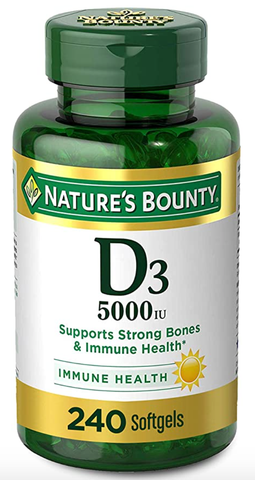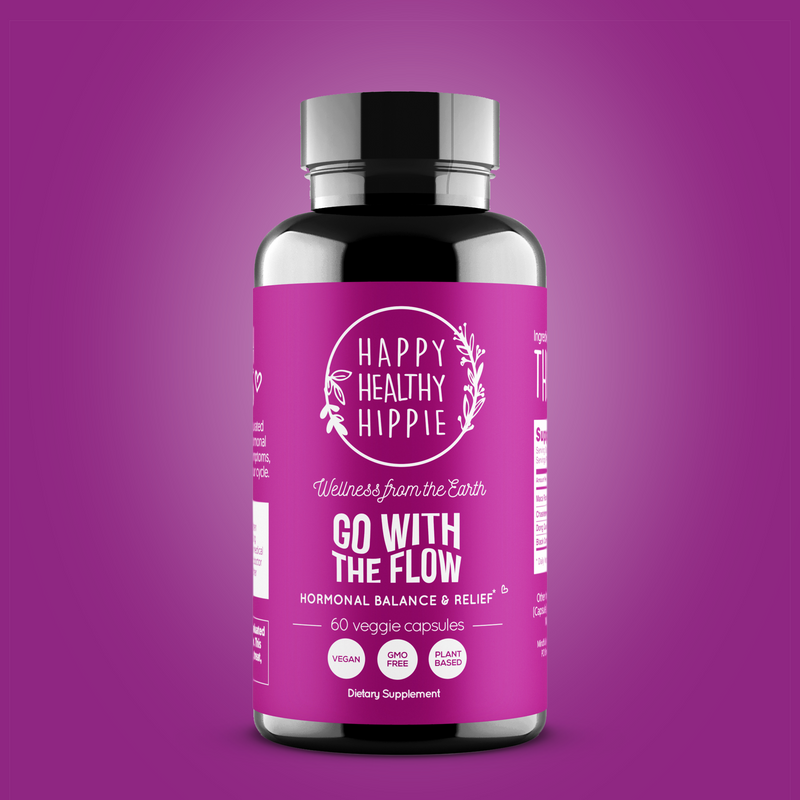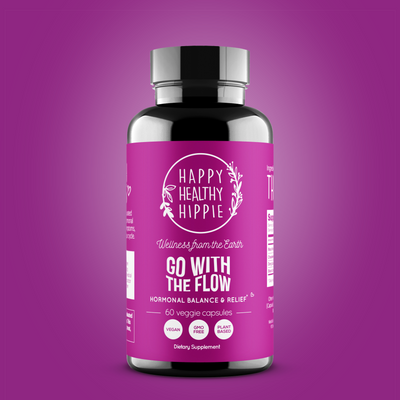
Ever notice how spending five minutes in the sunshine instantly makes you feel better?
It may have something to do with your body getting some of the vitamins for hormone balance that you need. After all, everything from the way your hair grows to how energized you feel when you first wake up in the morning is controlled by hormones.
But what happens when your hormones get out of whack? You may recognize the “side-effects” of hormone imbalance as persistent acne, weight gain, fatigue, and more.
Well, one of the best options is to use vitamins to naturally balance your hormones.
In this article, you’ll learn about the 7 best vitamins to balance your hormones naturally and feel your best.
How Vitamins Affect Your Hormones (and Mood!)
At the chemical level, vitamins and hormones are intricately linked.
Vitamins are micronutrients that, in optimal quantities, trigger vital processes in the body. They’re needed for normal cell function, growth, and development. Hormones, on the other hand, are chemical messengers that travel through your bloodstream and signal other body parts. Like vitamins, hormones regulate certain organs and crucial processes.

Image from NutraScience Labs
When you experience a hormonal imbalance, your body will warn you with physiological symptoms like fatigue, depression, insomnia, weight gain, and more.
The specific hormone imbalance signs depend on the imbalanced hormones — for example, high estrogen in women potentially results in premenstrual syndrome (PMS), adult acne, polycystic ovarian syndrome (PCOS), mood swings, and more.
Well, vitamins for hormonal imbalance may be one of the easiest solutions to alleviating these symptoms.
See, your body relies on vitamins to convert into energy, proteins, enzymes, and, yes (!), hormones.
For example, studies show that some vitamins, like vitamin D, are precursors to hormones. This means your body needs the right amount of vitamin D3 (also known as calcitriol) before it can convert it into a hormone produced by the kidney.
Without this essential vitamin and its later conversion, you could experience kidney disease or renal failure.
What’s more, research into the nature of hormones and vitamins has revealed that many vitamins act like hormones. Vitamin A is a prime example. It “exhibits properties of skin hormones,” besides producing other growth-related effects for the body.

These are just a few examples that show the vital role vitamins can play in balancing hormones. Curious to know what are the best vitamins for hormone balance?
Let’s dive right in.
7 Best Vitamins to Balance Your Hormones
Many factors can contribute to hormone imbalances, starting from environmental toxins to contaminated beauty products, major stressors, and even autoimmune conditions.
In other words, your body can use all the help it can get — so consider using any of these 7 vitamins for hormone balance.
#1. Go With the Flow Helps Female Hormonal Imbalance

Think of this like a multivitamin for hormone balance.
Go With the Flow features a curated blend of adaptogenic herbs and plants that help balance hormones related to PMS, mood swings, menopause, and even PCOS. The formula includes:
- Black cohosh root, a proven relief for vasomotor menopause symptoms such as hot flashes.
- Dong Quai, a root that treats the symptoms of PMS, including mood swings and cramps.
- Chasteberry, a plant that contains hormone-like compounds that help alleviate issues like PCOS, early menopause, and infertility.
- Maca root, a powerful hormone balance herb used to treat depression and fatigue, as well as provide a natural boost for your libido.
Go With the Flow ingredients are 100% plant-based and non-GMO. They’re highly bioavailable, which means that you can start bringing your hormones back into balance in just a few doses.
Go With The Flow is a 100% plant-based supplement that supports you by:
- Menopause and PMS relief through herbal remedies
- Balancing hormone levels
- Providing mental & emotional relief
- Reducing bothersome physical symptoms (acne, bloating, etc.)
Try it risk free with our 60-Day Money Back Guarantee.
#2. Vitamin D Affects Your Thyroid

The effects of vitamin D on the body are notable. You need it for a range of different functions including:
- Maintaining immunity.
- Absorbing calcium.
- Preventing weak and/or brittle bones (osteoporosis).
- Ensuring good dental development and oral health.
When it comes to this vitamin for hormone imbalance in women, however, it’s your thyroid that benefits the most. Vitamin D plays an important role in insulin regulation and the production of the thyroid hormones.
Without this vitamin to balance hormones, you could develop both a vitamin D deficiency and hypothyroidism.
#3. Vitamin B6 Can Help With PMS

One of the best vitamins for hormone balance is vitamin B6. It’s particularly useful when you’re trying to address estrogen-related issues such as PMS and PCOS.
Studies show that taking a consistent supplementation of vitamin B6 can help with mood swings, irritability, cramps, fatigue, and depression that accompany PMS in women.
#4. Vitamin E Supports Menopause

Both PMS and menopause are estrogen-related hormone imbalances that occur when women transition from one phase to another.
Vitamin E is a known vitamin for hormone imbalance. It can help soothe depression, mood swings, and stress related to the onset of menopause.
However, it doesn’t just help the mental and emotional symptoms, but the physical ones as well — studies show that vitamin E can help relieve the intensity and duration of hot flashes.
#5. Vitamin B3 (Niacin) Aids Stress

The B-vitamins are an essential group of vitamins for hormone balance. You can take these vitamins to address stress and mood changes related to both PMS and menopause. This kind of stress can trigger tension, anxiety, irritability, and poor concentration.
While it relieves menopausal stress, vitamin B3 can also smooth the transition between estrogen production in the ovaries to estrogen production in the adrenal glands and fat cells instead.
These are both post-menopause estrogen production sites and B3 helps stabilize estrogen production there once your ovaries stop producing it.
Pro-Tip: Along with B3, consider supplementing with folic acid if you’re of reproductive age. This vitamin can help prevent birth defects as well as boost a woman’s fertility.
#6. Magnesium Balances Your Reproductive Hormones

Magnesium is your hormones’ best friend. Not only does it help relieve the effects of menopause, it can also help boost your mood, calm the nervous system, reduce your blood sugar levels, and help you sleep.
In addition, magnesium also helps with the production of sex hormones - estrogen, progesterone, and testosterone.
With all these positive benefits, magnesium is definitely a vitamin for hormone imbalance that you need to incorporate into your daily routine right away.
#7. Vitamin K2 Metabolises Estrogen

Vitamin K2 is a curious vitamin. Research is still ongoing but we so far know that it provides a significant boost for vitamin D production, which, in turn, maintains bone and cardiovascular health.
When taken as a vitamin for hormone balance, however, vitamin K2 is the right solution if you’re looking to decrease estrogen dominance.
Studies show that vitamin K2 binds to the estrogen and androgen-converting enzyme 17 beta-HSD, which modulates estrogen metabolism. When estrogen is properly metabolized, less of the hormone remains in the body.
Furthermore, the process inhibits the overproduction of estrogen, which not only lowers the effects of high estrogen in men and women, but is also a potent support in fighting estrogen-related breast cancer.
Other (Natural) Ways to Balance Your Hormones
Besides vitamins for hormone balance, you can also use some other natural strategies to achieve the same effect. Consider making a few long-term lifestyle changes that include:
- Regular exercise. Choose high-intensity interval training circuits to boost your metabolism and yoga to soothe your stress.
- A hormone balance diet, including foods like organic tempeh, wild-caught salmon, bell peppers, and veggies like broccoli and bok choy.
- Use essential oils that can help balance your hormone levels.
- Stay away from stimulants like caffeine for a while, especially as you get your hormones back into balance. Instead, opt for natural energy boosters like Pick Me Up, a herbal formula designed to give you clean energy and pure focus.
Vitamins for Hormone Balance FAQ
#1. What Are The Best Vitamins To Take For Hormonal Imbalance?
The best vitamins for hormone balance include:
- Vitamin D
- Vitamin E
- Vitamin B6
- Folic acid
- Magnesium
#2. What Vitamins Help Balance Female Hormones?
If you’re looking for vitamins that can balance female hormones, you should consider incorporating:
- Vitamin K2
- Vitamin E
- Magnesium
#3. Do Vitamins Help with Acne Caused by Hormone Imbalance?
Yes, vitamins can go a long way in addressing acne related to PCOS, which, in turn, is caused by an overproduction of estrogen in the body. Vitamin D, B vitamins, and zinc can help hormone imbalances that cause acne.
#4. Do Vitamins Help with Weight Gain Caused by Hormone Imbalance?
The best way to use vitamins for hormone imbalance is to choose those that help metabolise blood sugar and control insulin. D3, K2, and zinc are all powerful regulators of hormonal weight gain, because they efficiently metabolize your body’s blood sugar.
Key Takeaways
Taking vitamins for hormone balance is not always an obvious solution.
Here are the main reasons why you should consider this option:
- Vitamins are a precursor to hormones and hormones need vitamins to work properly.
- You can get the most vital vitamins for hormone balance by combining your diet with smart supplementation.
- Whether you’re male or female, vitamin D3 and magnesium are the best vitamins for hormone imbalances in the body.
- You can also opt for herbal, plant-based hormone balance pills for fixing hormone imbalances, which are the equivalent to taking a multivitamin for hormone balance.
Related Articles
- 27+ Common Hormonal Imbalance Symptoms [Causes & Cures]
- The Pros and Cons of Hormone Pellet Therapy
- 15+ Tasty Foods That Boost Estrogen [Updated for 2021]


